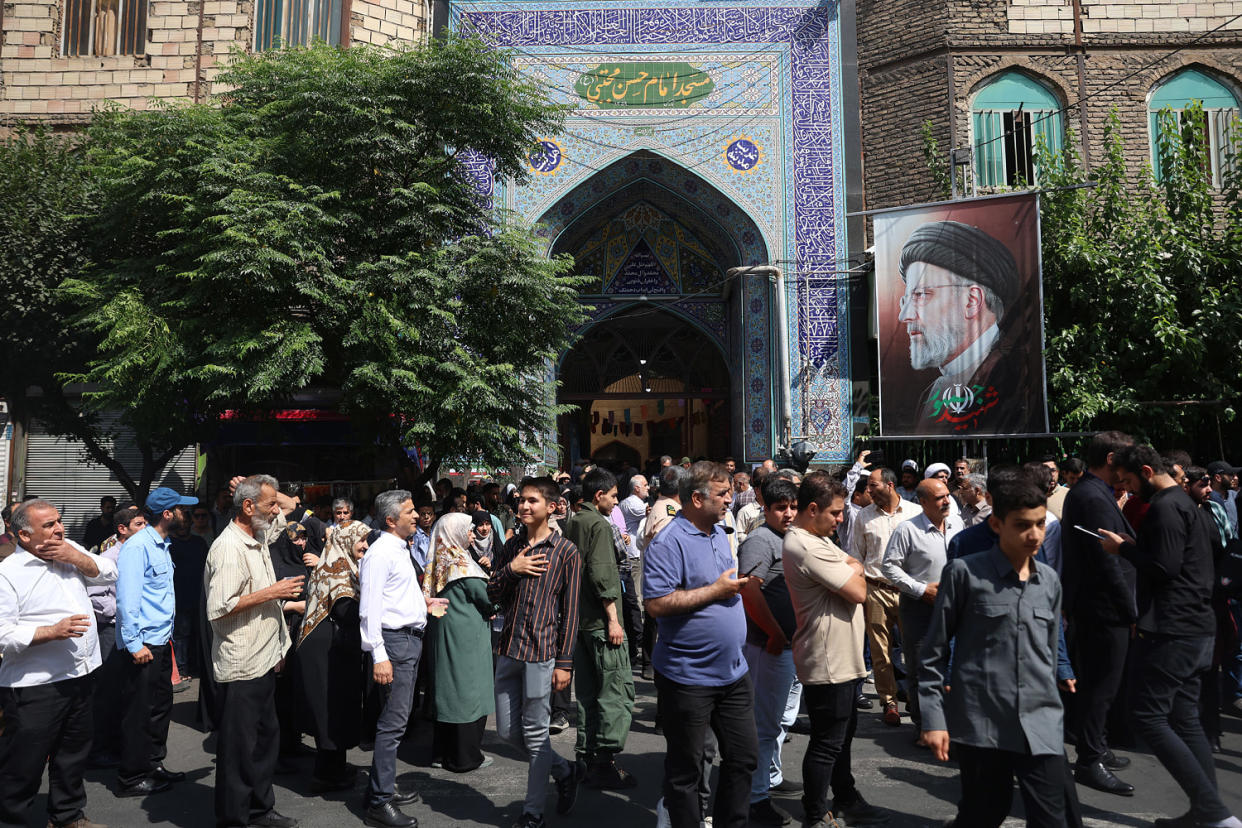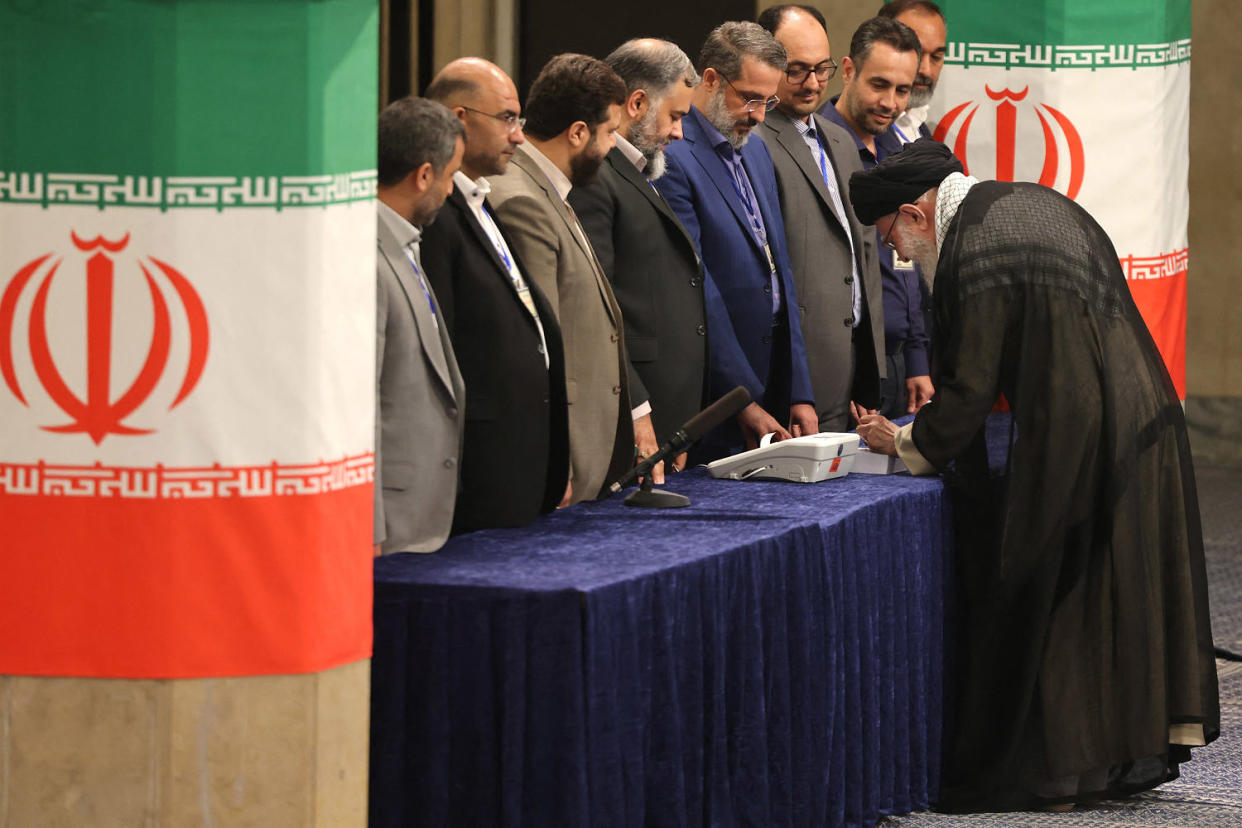Iranians vote to replace president who died in a helicopter crash
Millions of Iranians are heading to the polls Friday in a snap election called after President Ebrahim Raisi died in a helicopter crash last month.
Facing severe headwinds, including a flagging economy, regional tensions and the potential re-election of Donald Trump, whose administration worked to isolate the Islamic Republic, Iran’s leadership is looking for a high turnout to endorse its hard-line agenda.
Here is what to know about the tightly controlled election.
Why now?
The snap vote was called after Raisi died in a helicopter crash May 19, as Iran sought to replace the hard-line cleric who was seen as a potential successor to Iranian Supreme Leader Ayatollah Ali Khamenei.
Iran’s leaders have traditionally viewed high turnout as a sign of legitimacy — and that’s even more important now as the country tries to display continuity and stability in the wake of Raisi’s death.
Ahead of the vote Friday, Khamenei called for “maximum” turnout. But parliamentary elections in March had low turnout of 41%, according to Reuters, which cited the country's interior minister.
For many Iranians, the election is merely a formality to bestow an illusion of democracy, said Afshin Shahi, an associate professor in Middle East politics at England’s Keele University.
“Consequently, a vast majority of the populace no longer takes these elections seriously,” he said.
'Moderate' on the ballot?
The campaign started with six candidates selected by a hard-line panel of clerics and jurists — a list that was whittled down by Iran's appointed Guardian Council from 80 original applicants.
Two have dropped out in recent days.
Of the remaining four, three are considered hard-liners aligned with Khamenei, including one who is a cleric. In a surprise move, one comparatively progressive candidate was allowed to run.

The more moderate candidate, Masoud Pezeshkian, is a cardiac surgeon and former health minister who has campaigned on a promise to improve relations with the West, including negotiating a return to the 2015 JCPOA, which reined in Tehran’s nuclear program in exchange for sanctions relief.
The election is not expected to usher in any sweeping changes, and Khamenei will still call the shots on all state issues, but the president can have some sway in how those policies are carried out.
“The president can influence the tone and tenor of foreign policy, but he doesn’t have independent foreign policy decision-making authority,” said Sanam Vakil, director of the Middle East and North Africa program at Chatham House, a London-based think tank. “And certainly he is important for directing economic policy and the social agenda and climate inside Iran.”
The economy
Iran finds itself battling a crushing economic crisis, largely due to stiff global sanctions and international isolation.
The sanctions reimposed after then-President Donald Trump withdrew from the landmark Obama-era nuclear deal left the government with dwindling revenues and worsening living standards for ordinary Iranians.
“The economy is the key topic for this election,” Vakil said. “Ordinary people are suffering, and the inflation is really high. But the economic policy is very much tied to Iran’s posture vis-a-vis the West, its nuclear program and ultimately sanctions.”
No candidate has really put forward novel economic policies, Vakil added.
“What they are calling for are more effective efforts at managing sanctions,” she said.
Women’s rights
No women are on the ballot, and no woman has ever been approved to run for president in Iran.
The status of women will be on the minds of many following the death of a Kurdish Iranian woman after she was detained by the country’s morality police.
The women-led demonstrations that swept the country after 22-year-old Mahsa Amini's September 2022 death triggered mass protests, shaking the clerical establishment to its core and sparking a dramatic government crackdown.
All of the candidates in the race have distanced themselves from violence or harsh punishment being doled out to women caught without the hijab, but the issue is likely to persist.
“Social freedom is indeed at the forefront of voters’ minds,” Vakil said.
Regional tensions
The war in the Gaza Strip in which Iran has backed Hamas has led to all-time high regional tensions and has already seen Iran directly attack Israel for the first time.
The outcome of Friday’s election is unlikely to change that course, Shahi said.

“Just before the election day, the supreme leader publicly affirmed that fundamental aspects of Iranian foreign policy, such as support for militant groups across the region and anti-Americanism, are immutable,” he said.
But American politics did factor in to Friday’s vote.
Trump has come up repeatedly during the campaign as an unpredictable enemy who may be harsher than President Joe Biden.
“I think most of the candidates are sort of factoring in a Trump victory,” Vakil said. “And they are trying to position themselves as being the appropriate candidate to manage a more confrontational posture with the United States.”
